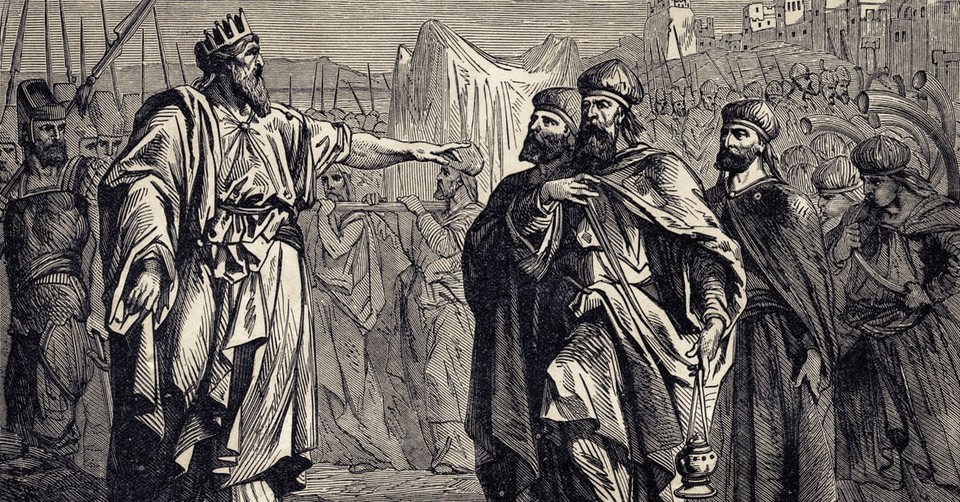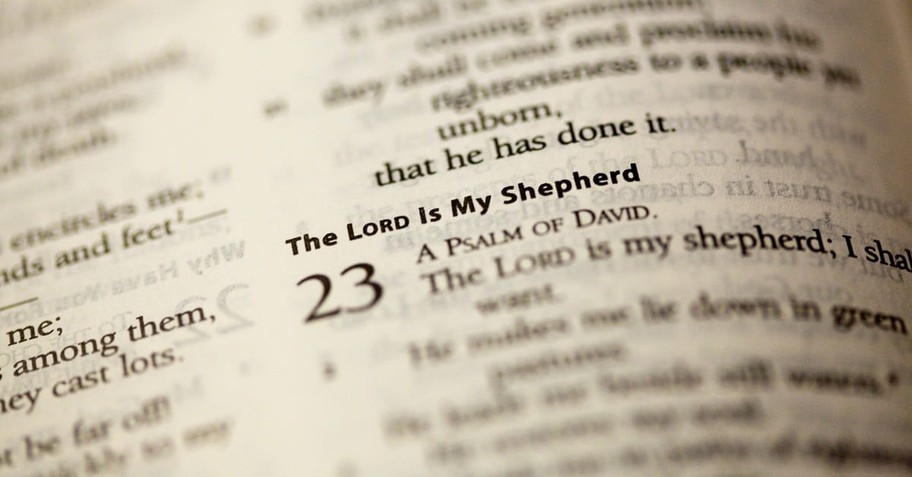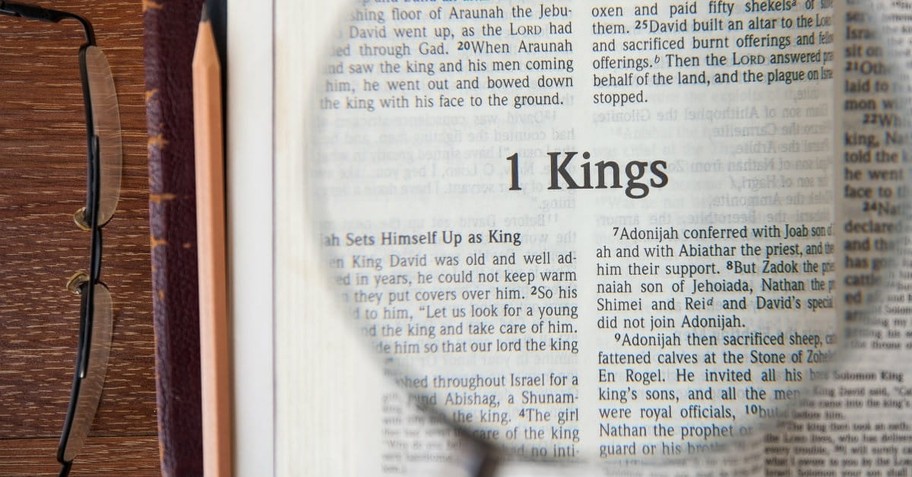King David in the Bible – Who Was He? Why Is He Important?

“O God, You are my God; I shall seek You earnestly; My soul thirsts for You, my flesh yearns for You, In a dry and weary land where there is no water. Thus I have seen You in the sanctuary, To see Your power and Your glory. Because Your lovingkindness is better than life. My lips will praise You.” (Psalm 63:1b-3)
Did you know that more has been written about David than any other biblical character? Sixty-six chapters are dedicated to him. That doesn’t include fifty-nine references to him in the New Testament. How important do you think King David was to Israel?
David was young when Samuel found him. David had been shuffled off to his father’s fields to work as a shepherd boy. His father must have viewed him as trustworthy and responsible to give him sole care of his herds. In reality, he was in God’s training ground learning to be a king.
Photo Courtesy: Lightstock

Introduction of King David
The nation of Israel was living in turbulent spiritual times. The leaders wanted a king like the other nations. They were tired of worshipping a king they couldn’t see. Slowly and over time, they had fallen away from the LORD.
“And it came about when Samuel was old that he appointed his sons judges over Israel... His sons, however, did not walk in his ways…” (I Samuel 8:1,3)
“Then all the elders of Israel gathered together and came to Samuel at Ramah, and said to him, "Look, you are old, and your sons do not walk in your ways. Now make us a king to judge us like all the nations.” (I Samuel 8:4-5)
“But the thing was displeasing in the sight of Samuel when they said, 'Give us a king to judge us.' And Samuel prayed to the LORD. The LORD said to Samuel, 'Listen to the voice of the people in regard to all that they say to you, for they have not rejected you, for they have rejected Me from being king over them.'” (I Samuel 8:6-7, emphasis added)
Samuel spoke on behalf of the LORD and gave Israel warnings regarding requesting a king. They refused to listen to Samuel. The LORD told Samuel to appoint them a king. (I Samuel 8:10-22) God must have felt the sting of rejection.
Photo Courtesy: Thinkstock

The Rise and Fall of Saul
Saul, the people’s choice, was chosen to be king. He started out strong. He slowly declined until his life ended tragically and in disgrace.
“Samuel said to Saul, ‘You have acted foolishly; you have not kept the commandment of the Lord your God, which He commanded you, for now the Lord would have established your kingdom over Israel forever. For now your kingdom shall not endure. The Lord has sought out for Himself a man after His own heart, and the LORD has appointed him as ruler over His people, because you have not kept what the LORD commanded you.’” (I Samuel 13:13-14)
God rejected Saul as king.
It was time for God to intervene. It was time for God to put His man on the throne--and He was going to use Samuel to help Him do just that.
“Now the LORD said to Samuel, ‘How long will you grieve over Saul, since I have rejected him as king over Israel? Fill your horn with oil and go; I will send you to Jesse the Bethlehemite, for I have selected a king for Myself among his sons.’” (I Samuel 16:1, emphasis added)
Photo Courtesy: Thinkstock

David Is Anointed as King
Samuel followed the instructions of the LORD despite his fears. He came to the home of Jesse. He saw his son Eliab. Based on his appearance, he thought surely this is the LORD’s choice.
“But the LORD said to Samuel, ‘Do not look at his appearance or at the height of his stature, because I have rejected him; for God sees not as man sees, for man looks at the outward appearance, but the LORD looks at the heart.’” (I Samuel 16:7, emphasis added)
After inquiring, Samuel finds out that Jesse has one more son, his youngest, who is tending sheep.
“Then Samuel said to Jesse, ‘Send and bring him; for we will not sit down until he comes here.’ So he sent and brought him in. Now he was ruddy, with beautiful eyes, and a handsome appearance. And the LORD said, ‘Arise, anoint him; for this is he.’” (I Samuel 16:11b-12)
“Then Samuel took the horn of oil and anointed him in the midst of his brothers; and the Spirit of the LORD came mightily upon David from that day forward. And Samuel arose and went to Ramah.” (I Samuel 16:13)
According to Charles R. Swindoll, Josephus, the historian, says, “Samuel the aged whispered in his [David] ear the meaning of the symbol, ‘You will be the next king.’”
David was anointed as king while Saul was still on the throne.

David as 'A Man After God's Own Heart'
David’s father had sent him off to the fields to watch over the family flock. He spent hours alone tending sheep. He learned the meaning of surviving in the wild. He slept out under the cover of darkness. He learned to endure the change of seasons and weather the elements. Surely, loneliness was his constant companion.
No doubt, he had many conversations with God while he was living alone in solitude. We can see proof of this in his writings in the Psalms.
David also lived in complete obscurity.
“Men and women of God, servant-leaders in the making, are first unknown, unseen unappreciated, and applauded. In the relentless demands of obscurity, character is built. Strange as it may seem, those who first accept the silence of obscurity are best qualified to handle the applause of popularity.” (Chuck Swindoll)
Chuck Swindoll describes one of God’s favorite methods of training as monotony: “That’s being faithful in the menial, insignificant, routine, regular, unexciting, uneventful, daily tasks of life. Life without a break…without the wine and roses. Just dull, plain L-I-F-E. Just constant, unchanging, endless hours of tired monotony as you learn to be a man or woman of God…with nobody else around, when nobody else notices, when nobody even cares. That’s how we learn to ‘king it.’”
Photo Courtesy: Thinkstock

Was David a Good King?
David was “a skillful musician, a mighty man of valor, a warrior, one prudent in speech, a handsome man,” and the LORD was with him. (I Samuel 16:18)
We also see from the many Psalms that David was a talented musician and a songwriter. His gentleness as a harpist reveals his true inner sensitivity as an artist.
While David was tending the flock, he was learning to play the harp. God was preparing him to serve a king.
“Now the Spirit of the Lord departed from Saul, and an evil spirit from the Lord terrorized him.” (I Samuel 16:14)
Saul’s servants knew about David and they sent for him on Saul’s command to find someone who could play well.
“Then David came to Saul and attended him; and Saul loved him greatly, and he became his armor bearer.” (I Samuel 16:21)
Whenever the evil spirit from God overwhelmed Saul, David would play his harp and Saul would calm down and be refreshed, and the evil spirit would leave Saul alone. (I Samuel 16:23)
Photo Courtesy: Lightstock

David's Courage
Even as a young man, he was given the responsibility of protecting the family's herd of sheep.
“...Your servant was tending his father’s sheep. When a lion or a bear came and took a lamb from the flock, I went after him and attacked him, and rescued it from his mouth; and when he rose up against me, I seized him by his beard and struck him and killed him." (I Samuel 17:34-35)
This is the reality that David had been living and the training ground God had been using to prepare David to be king one day.
He is best known for killing the giant Goliath with a sling and stone.
Everything David did in the sight of the people was pleasing to them. Everywhere Saul sent him, he prospered. (I Samuel 18)
It was David’s success as a mighty warrior that fueled Saul’s jealousy. When he heard the women dancing in the streets singing, “Saul has slain his thousands, And David his ten thousands,” Saul became very angry. (I Samuel 18:7) He turned against David. He pursued David for the rest of his life.
Photo Courtesy: Thinkstock

King David's Great Sin
“Then it happened in the spring, at the time when kings go out to battle…But David stayed in Jerusalem.” (2 Samuel 11:1)
David’s choice to stay back was poor leadership and wasn’t his usual practice. His decision was bad judgment on his part and set the stage for his devastating fall into iniquity.
“Now when evening came David arose from his bed and walked around on the roof of the king’s house, and from the roof he saw a beautiful woman bathing; and the woman was very beautiful in appearance.” (2 Samuel 11:2)
He looked. He inquired. He sent for her.
“The woman conceived; and sent and told David, and said, ‘I am pregnant.” (2 Samuel 11:5)
Deception. Conspiracy. Murder. Lying.
David conspired to have her husband killed in the field of battle so that he could take Bathsheba as his wife.
Nathan the prophet rebuked David severely. “Then David said to Nathan, 'I have sinned against the LORD.' And Nathan said to David, 'The LORD also has taken away your sin; you shall not die.'” (2 Samuel 12:13)
Sadly, David and Bathsheba lost the child that she bore to David. “Then David comforted his wife Bathsheba, and went in to her and lay with her; and she gave birth to a son, and he named him Solomon. Now the LORD loved him and sent word through Nathan the prophet, and he named him Jedidiah [“Beloved of the LORD”] for the LORD’s sake.” (2 Samuel 12:24-25, emphasis added)
Photo Courtesy: Lightstock

Death of King David
"Then David slept with his fathers and was buried in the city of David. The days that David reigned over Israel were forty years; seven years he reigned in Hebron and thirty-three years he reigned in Jerusalem." (I Kings 2:10-11)
"And Solomon sat on the throne of David his father, and his kingdom was firmly established." (I Kings 2:12)
Over 400 years separated the final events and final prophecy recorded in the Old Testament (ca. 424 B.C.) from the beginning actions narrated in the New Testament (ca. 6 B.C.) Because there was there was no prophetic word from God during this time, this period is sometimes called “the four hundred silent years.” Though the voice of God was silent, the hand of God was actively directing the course of events during these centuries.
“So all the generations from Abraham to David are fourteen generations; from David to the deportation to Babylon fourteen generations; and from the deportation to Babylon to the Messiah, fourteen generations.” (Matthew 1:17, emphasis added)
“Thus says the LORD of hosts, 'Your house and your kingdom shall endure before Me forever; your throne shall be established forever.' In accordance with all these words and all this vision, so Nathan spoke to David.” (2 Samuel 7:16-17, emphasis added)
Allyson Holland is a former Director of Ministry to Women and former board member for Thrive Ministry. She is lifestyle blogger (allysonholland.com/blog), writes for Publishous, The Ascent, and has been a guest writer for Bible.org. Ally has been married to John for 30 years and they have five children. John and Ally serve as leaders in Re-Engage at Watermark Community Church, Dallas, Texas. Ally suffers from RSD and is passionate about God’s redemptive work in the lives of those who suffer from physical and emotional pain.
Photo Courtesy: Thinkstock/aradaphotography
Originally published March 08, 2021.








